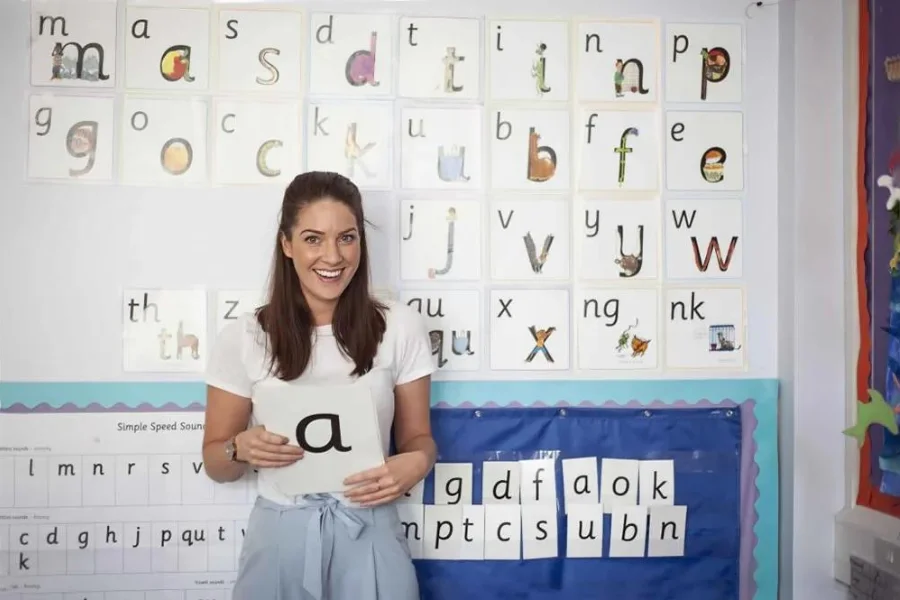
Source: landmarkschool
In the digital age, education has witnessed a transformative shift, making learning accessible and convenient for learners worldwide. Vidhyanidhi Education Society (VES), with its commitment to excellence, introduces the Online Phonics Training course tailored for educators, parents, and anyone keen on mastering the art of phonics.
This Online Phonics Training course promises:
Ease of Access
Experience unparalleled convenience with our Online Phonics Training. Learn from the comfort of your own home, office, or any location of your choice. This program eliminates geographical barriers, allowing access to quality education no matter where you are. Perfect for busy individuals, parents, and those living in remote areas.
Interactive Modules
Dive into our captivating lessons, meticulously designed to foster a deep understanding of phonics principles. Our interactive modules are not just informative but also entertaining, ensuring that learning phonics is not a chore but an enjoyable journey. The engaging content keeps learners motivated and eager to explore more.
Flexible Timings
Our Online Phonics Training is tailored to fit into your unique lifestyle. With flexible timing options, you can choose a schedule that best suits your daily routine, making it ideal for students, professionals, and stay-at-home parents. No need to rearrange your life around classes; we adapt to you.
Certified Expertise
Upon successful completion of the Online Phonics Training, you will be awarded a recognized certificate, validating your proficiency in phonics. This certification is not just a testament to your dedication but also enhances your credibility in the field, opening doors to new opportunities.
Supportive Community
Become part of an active and supportive community of phonics enthusiasts. This platform allows you to share experiences, insights, and strategies with fellow learners and experts. Grow together in a collaborative environment where every member is encouraged to contribute and expand their phonics knowledge.
With Online Phonics Training, Vidhyanidhi Education Society brings you closer to the world of early childhood literacy, bridging the gap between traditional methods and modern techniques. Equip yourself with this essential skill set and contribute meaningfully to the literacy journey of young learners.
Whether you’re an educator looking to enhance your teaching arsenal or a parent seeking effective ways to assist your child’s reading journey, this Online Phonics Training course is your go-to guide. Embrace the change; embrace the power of phonics.

Source: verywellfamily
Benefits of Phonics
The following are the enormous Benefits of Phonics:
- Phonics provides clarity on the distinct sounds of English letters.
- It acts as a decoder, helping children differentiate between letter names and their sounds.
- With a grasp on these sounds, word formation, and reading become more intuitive.
- It also aids in identifying individual sounds in words for efficient spelling.
- The trio of reading, writing, and spelling is enhanced by the foundational support of phonics.
- Effective phonics instruction is achieved through targeted teacher training.
Career Scope for Phonics Teacher
Navigating the phonics teaching landscape, especially with Online Phonics Training from the Vidhyanidhi Education Society, reveals an array of lucrative Career Scope for Phonics Teachers.
Let’s illuminate the potential trajectories for a skilled phonics practitioner:
- Spearhead a home-based phonics venture, reaping substantial rewards with minimal overheads.
- Stand out in the private tutoring circuit by infusing phonics into your lesson plans, adding a unique selling proposition.
- Step confidently into esteemed educational establishments, from kindergartens to primary schools, all in need of your phonics prowess.
- Broaden your pedagogical spectrum within schools by embracing phonics, setting the stage for enhanced career progression.
- Be a cornerstone of international teacher training outfits, bringing a phonics-centric edge to their curricula.
- Collaborate with global educational powerhouses as a phonics curriculum visionary or academic content craftsman.
- Your phonics mastery can lead you to helm prestigious positions in educational hubs or creative activity centers.
- Shoulder the invaluable role of guiding children with specific learning requirements through tailored phonics interventions.
- Online Phonics Training doesn’t just redefine professional prospects; it empowers parents to play a pivotal role in their children’s linguistic evolution.
To know more, get in touch at +919869546913 / +919869866277.
Get your hands on our brochure Here.

Source: blog
Phonics Online Programs
VES emerges as a top pick for Certificate Phonics Online Programs in India.
Major strengths include:
- Open-door enrolment policy.
- Rationalized Online Phonics Training course pricing.
- Effortless registration system.
- Join from anywhere across the globe.
- The sole prerequisite is a steady internet connection.
- Thoughtfully curated Online Phonics Training course modules.
- Comprehensive downloadable study aids.
- Aids consist of a teaching guide, varied worksheets, colorful flashcards, and relevant multimedia supports.
- Focused and engaging online discussions.
- Courses led by industry veterans.
- Balanced assessment process.
- Certificates without mode specification.
- Direct delivery of certificates.
- A certificate of global stature.
Curriculum for Phonics Courses for Teachers
After extensive market research, our team offers a balanced Curriculum for Phonics Courses for Teachers that includes:
- The Essence of Phonics
- A Tour through Various Phonics Programmes
- Evaluating Phonics against the Whole Language Approach
- Basics of Letter Sounds and Their Creation
- The Science of Blending and Segmenting Words
- Understanding Consonant Blends in Depth
- Breaking Down Digraph Sounds
- Drawing Distinctions between Digraphs and Blends
- Deciphering Challenging Words
- Phonics Standards Explained
- A Guide to Vowel Sound Variations and Spelling Techniques.

Source: ruthumskin
Structure of Phonics Teachers Training Course
VES offers a smooth Structure of Phonics Teachers Training Course, making your learning journey enjoyable:
- Start a conversation with us
- Absorb our methodology
- Confirm your participation
- Absorb the knowledge
- Challenge yourself with the test
- Take pride in your certificate
- Move forward with Phonics education
- Let the joy flow!
Duration of Online Phonics Training
Over six consecutive days, the Duration of Online Phonics Training offers 3-hour sessions, totaling an overall duration of 18 hours.
Eligibility for Online Phonics Training
A rudimentary English skill set is the primary Eligibility for Online Phonics Training.
Phonics Teacher Salary
A Phonics Teacher Salary is influenced by diverse aspects like the remuneration approach of the school, its location, the teacher’s credentials, and what’s trending in the market. Yet, professionals with Online Phonics Training can typically command a handsome five-figure sum.
Phonics Course Fees
VES has made Online Phonics Training courses affordable for everyone, by offering much lower Phonics Course Fees than the usual market prices. And the variety of discounts and payment plans adds to the appeal.

Source: luckykids
What is Whole Language?
Whole Language is a philosophy of literacy instruction that contrasts with more traditional phonics-based methods. The approach emphasizes the meaning and function of language as opposed to its isolated phonetic components.
Here are some key principles and features of the What is Whole Language:
Holistic Approach
Instead of breaking down language into discrete components (like phonics, grammar, or spelling lessons), Whole Language teaching emphasizes integrated, purposeful learning.
Contextual Learning
Words and language are best learned in context. For instance, instead of memorizing word lists, a student might engage with complete stories, articles, or other meaningful content.
Emphasis on Literature
Whole Language classrooms often have a rich supply of children’s literature. The idea is to expose students to authentic texts instead of contrived sentences or passages.
To know more, get in touch at +919869546913 / +919869866277.
Get your hands on our brochure Here.
Student-Centered
Learning is individualized. Teachers act more as facilitators, allowing students to set their own reading and writing goals and to select their reading materials.
Writing Process
Writing is emphasized as much as reading. Students are motivated to see themselves as writers. They learn writing by actually writing, going through the processes of drafting, revising, and publishing.
Natural Development
Whole Language proponents believe that children will naturally pick up on the rules of spelling, grammar, and punctuation as they read and write, rather than needing explicit instruction.
Constructivist Learning
Based on the constructivist theory, Whole Language assumes that students build their knowledge based on their experiences. Thus, teaching focuses on providing meaningful experiences rather than direct instruction.
It’s worth noting that Whole Language has been the subject of controversy in the world of education. Critics argue that without direct phonics instruction, some students may never acquire efficient decoding skills, which can hinder their reading progress. In response, many educators advocate for a “balanced literacy” approach that combines elements of both phonics and Whole Language.
Despite the controversy, it’s clear that Whole Language has had a lasting impact on literacy education, particularly in its emphasis on meaningful, authentic reading and writing experiences.
What is Analytic Phonics?
Analytic Phonics is one approach to teaching phonics, which focuses on recognizing and analyzing the phonetic components of words that are already somewhat familiar to learners. Rather than teaching individual sounds in isolation (as is done in synthetic phonics), Analytic Phonics emphasizes whole-word recognition and the relationships between whole words.
Here are some key characteristics of What is Analytic Phonics:
Whole Words First
Analytic phonics typically starts with a whole word, particularly words that students are familiar with or can recognize on sight. From there, the phonetic components of the word are analyzed.
Word Families
A common strategy in analytic phonics is to introduce learners to word families or rimes. For instance, by understanding the “-at” sound, a learner can decode a range of words like “cat,” “bat,” “rat,” and “mat.”
Comparing and Contrasting
Students are often encouraged to compare words to recognize phonetic similarities and differences. A student can recognize the similar “d” and “o” sounds in “dog” and “dot,” for instance, while also distinguishing between “g” and “t.”
Avoidance of Isolated Sounds
Analytic phonics begins with whole words and breaks them down, in contrast to synthetic phonics, which teaches individual sounds (phonemes) separately before combining them into complete words.
Emphasis on Meaning and Context
Words are often presented in meaningful contexts, which can assist students in understanding the relationship between phonetic patterns and word meanings.
Use of Onset and Rime
Analytic phonics often uses the onset (initial consonant or consonants) and rime (the vowel and any following consonants) structure of words to aid in recognition and decoding. For example, the word “black” can be broken down into the onset “bl-” and the rime “-ack.”
It’s worth noting that while both analytic and synthetic phonics have their advocates, many effective reading programs incorporate elements of both methods. Research has shown the importance of phonics instruction in early reading development, but the best approach often depends on the individual needs and learning styles of students.
What is Phonics Awareness?
It seems you’ve combined two related but distinct concepts: “Phonological Awareness” and “Phonics” in “What is Phonics Awareness?”
Let me clarify both:
Phonological Awareness
- This is a broad skill that includes identifying and manipulating units of oral language – parts such as words, syllables, and onsets (initial consonant sounds) and rimes (following vowel and consonant sounds).
- It’s about the sound structure of spoken language and doesn’t necessarily involve the letters of written language.
- Phonemic awareness, a type of phonological awareness, focuses on recognizing individual sounds or phonemes in words. For example, the word “fin” is made up of the phonemes “f,” “i,” and “n.”
Phonics
- Phonics refers to the correlation between letters (graphemes) and their respective sounds (phonemes).
- In essence, it deals with how particular sounds in spoken language are represented by written letters (or letter combinations).
- In phonics instruction, students are taught to decode words by mapping the letters in words to their corresponding sounds. For instance, seeing the written word “dog” and recognizing it is pronounced as /d/ /o/ /g/.
- Many reading education strategies have a strong emphasis on phonics, which aids children in acquiring the decoding abilities necessary for fluent reading.
Thus, to put it plainly
- Phonological Awareness is about recognizing and working with sounds in spoken language.
- Phonics is about understanding the relationship between those sounds and how they are represented in written language.
Be at the forefront of phonics teaching brilliance!
To know more, get in touch at +919869546913 / +919869866277.
Get your hands on our brochure Here.
FAQs
How to be a Phonics teacher?
To be a Phonics teacher: Master phonetic concepts, gain teaching experience, and enroll in VES's top-notch Phonics Teacher Training Programme Online for expertise.
How do you teach Phonics in a fun way?
Teach Phonics in a fun way: Incorporate engaging games, interactive stories, songs, and hands-on activities to captivate students' attention.
What is the Phonic sound of i?
The Phonic sound of "i" is /ɪ/ as in "igloo" or "in". This short vowel sound is foundational in many words.



